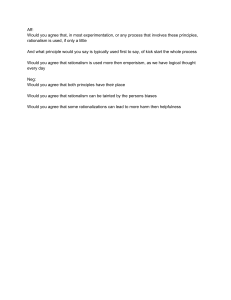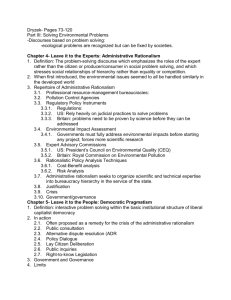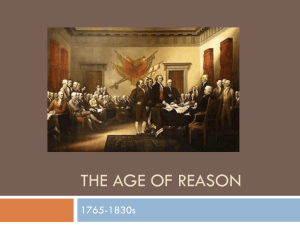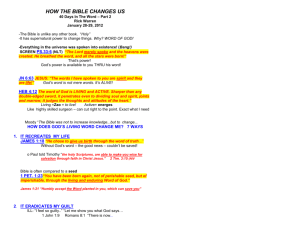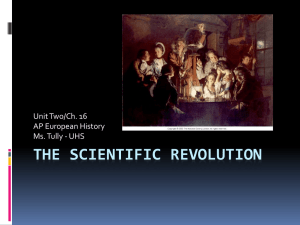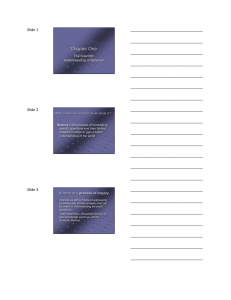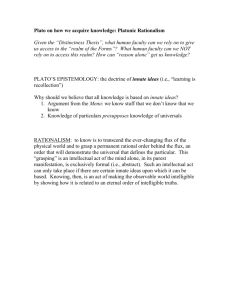American Rationalism (1750
advertisement
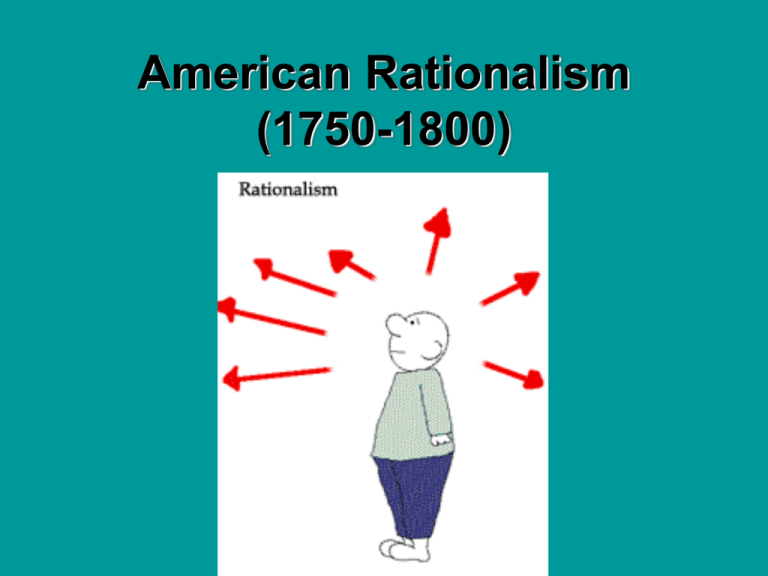
American Rationalism (1750-1800) Rationalism • Rationalism – the belief that human beings can arrive at truth by using reason, rather than by relying on the authority of the past, on religious faith, or intuition. • REASON! A reaction against Puritanism • By the end of the 17th century, reason began to present a challenge to the unshakable faith of the Puritans. VS. Descartes’ "I think, therefore I am," replaces Anselm’s "I believe so that I might understand.” REASON and LOGIC become more important than FAITH and RELIGION Thomas Jefferson’s Bible • Jefferson changed parts of the Bible to create a new version— particularly the parts that tell the life of Jesus • In it, he removed all references to supernatural aspects: miracles, angels, and the divinity and resurrection of Jesus. • He wanted a Bible that showed Jesus as a great moral teacher, but nothing more. • Often called “The Age of Reason” or “The Enlightenment” • Less focus on hell or life after death – more concern with creating a better life on earth. …and yet… I believe in one God, and no more; and I hope for happiness beyond this life. THOMAS PAINE THE AGE OF REASON God’s Gift to Humanity was… • Reason – the ability to think in an ordered, logical manner enabled people to discover both scientific and spiritual truth. “Reason and free inquiry…are the natural enemies of error, and of error only.” Thomas Jefferson, Notes on the State of Virginia Unlike the Puritans… • Rationalists believed people were able to perfect themselves— through good works and self effort I will not drink 5 Dr. Pepper Big Gulps today! A scientific explanation for God’s existence • Sir Isaac Newton compared God to a clockmaker. • the Great Machine must have a Mechanic or a Supreme Architect. Deism • God had made it possible for all people at all times to discover natural laws through their God-given power of reason. Deists believed – The universe was orderly and good. – Through the use of reason, every human being was perfectible. – God’s objective was the happiness of his creatures. – There were punishments and rewards after this life – Their faith was a philosophy and a guide for an ethical way of living rather than an organized religious institution Deists did NOT believe – In superstition – In the holy trinity – In a literal interpretation of the bible – That worship required attending a service (one could worship privately) John Locke said “Believe in Jesus and lead a moral life.” Rationalism Literature: - mostly devoted to politics, philosophy, ethics, and science – Persuasive essays and pamphlets – Songs – Speeches – Poems – Documents such as The Declaration of Independence--which bases its arguments on rationalist assumptions about the relations between people, God, and natural law. Reason thrived on… • • • • Freedom of speech Freedom from arbitrary rules Freedom to experiment Freedom to question existing laws and institutions The Age of Reason in the United States differed from previous Rationalism movements in Europe namely because American citizens could test new ideas as they created a new society. Rationalism was about HOPE • “What then is…this new man? He is an American, who, leaving behind him all his ancient prejudices and manners, receives new ones from the new mode of life he has embraced, the new government he obeys, and the new rank he holds…[In America] individuals of all nations are melted into a new race of men, whose labors…will one day cause great changes in the world.” – Michel-Guillaume Jean de Crevecoeur, Letters from an American Farmer

